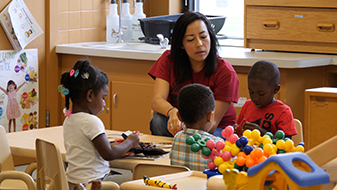A Head Start to Success
By: Kaitlyn Hale
Preparing a child for school involves a lot more than just academic success; it's a process that starts the day a child is born and involves school readiness skills that includes responsive parenting, the development of social emotional skills and repeated opportunities to learn in a variety of contexts that include parents, teachers and peers. The Center for Early Head Start at Texas Tech is ensuring families have the resources they need to set their children up for success.
“We know even starting to think about school readiness and social-emotional development in the preschool years is almost too late, which is why the Early Head Start program focuses on families and their children from prenatal to age three,” said Ann Mastergeorge, the chairperson and Rockwell endowed child and family professor in the Department of Human Development and Family Studies. “We know every time a parent is interacting with their child, every time a parent is talking with their child, every time a parent is singing or reading to their infant, they are creating connections in a brain that will grow expediently. Without consistent responsive interactions, a child's brain architecturally looks very different.”
Located in East Lubbock, the Center for Early Head Start provides child care, parent education, home visits, and many other services to families and children living in poverty.
The program is funded with two annual grants totaling $1.5 million from the US Department of Health and Human Services, Administration for Children and Families, and, in May, the Texas Tech University Board of Regents approved the program's designation as a university-recognized center which is a great acknowledgment of the growth and evolution of Early Head Start at Texas Tech.
“Having a center designation is important because it takes us up a notch from a program that serves families in East Lubbock and Texas Tech students, to a program that is a center of research,” said Stephanie Shine, the executive director of the Center for Early Head Start. “This way, we can not only validate what we do in East Lubbock, but we can contribute to the knowledge base of the whole country.”
Becoming a center also opens up more opportunities for collaboration both in Lubbock and across the nation and makes the center a contender in the research arena.

“There are so many things that moderate or mediate the outcomes for children and their success,” Mastergeoge said. “So now having a center designation allows us to really examine those variables at a more microlevel.”
One of these variables is how the child's environment in and out of the classroom affects how they learn, so the Center for Early Head Start has implemented programs for parents as well. These parent programs relate to jobs as well as physical and mental health. Parents are also encouraged to work closely with teachers and observe their children in the classroom setting.
“There are a lot of ways in which parents learn to reduce the stress in their lives that may be impacting their positive parenting practices,” Mastergeorge said, “and they also learn the kind of things that are important for young children to be learning in order to be successful in school.”
To enhance children's learning environments, the Center for Early Head Start recently began collaborating with faculty involved with the Outdoor Learning Environments (OLE! Texas) initiative to design outdoor learning areas that encourages children to be active, learn in nature, and develop social interactions.
"It's a great opportunity for us to learn if design interventions make a difference in cognitive and classroom performance, behavior, and developmental milestones." said Kristi Gaines, associate dean of the Graduate School and associate professor in the Department of Design.
"We're incorporating natural elements into a learning environment through the use of 12 best practice indicators," Gaines said. " The evidence-based approach includes elements such as a looping, curving pathway, mud kitchens, even little acorns and sticks. We're trying to get them to explore and use their imaginations."
The collaboration with OLE! Lubbock is just one example of the potential partnerships ahead of the Center for Early Head Start. In 2015, an expanded grant allowed the Lil' Precious Steps day care in East Lubbock to secure the Early Head Start designation. Mastergeorge sees more collaborations with similar day cares in Lubbock and beyond in the center's future.
Shine said she is excited to have an off-site, community-based research center that serves Lubbock, and looks forward to the research ahead.
“I hope that we can become a very vibrant center for research,” Shine said, “that we can attract researchers to conduct research at our center, to validate and contribute to what we know about the benefits of Early Head Start in the wider community.”
Discoveries
-
Address
Texas Tech University, 2500 Broadway, Box 41075 Lubbock, TX 79409 -
Phone
806.742.3905 -
Email
vpr.communications@ttu.edu
